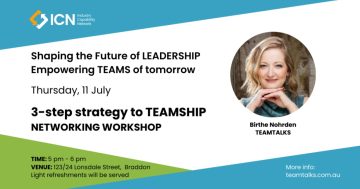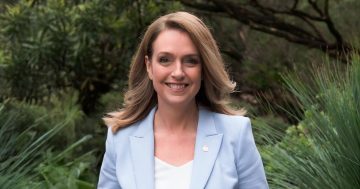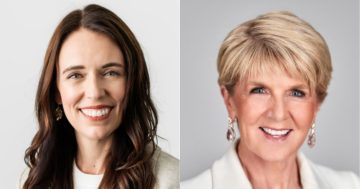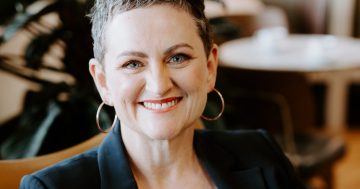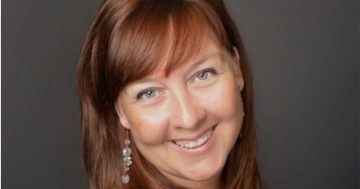By Angela Priestley.
 Claire Bibby attended 15 minutes of a professional conference a fortnight ago before walking out, because the first session — a “grand panel” no less — featured an all-male lineup of four men.
Claire Bibby attended 15 minutes of a professional conference a fortnight ago before walking out, because the first session — a “grand panel” no less — featured an all-male lineup of four men.
But the senior in-house lawyer and non-executive director didn’t leave before telling the organisers exactly why she was heading for the door, and what she thought of the “sausage fest”.
The event was the Innoxell Annual Symposium, a seminar on: “Legal, Risk, Compliance, eDiscovery, Financial Crime, Corporate Governance and Data Privacy”.
It featured a number of women on the program, but still managed to schedule all-male panels throughout the day.
And I am stunned that an event like this would feature an all-male panel, especially in the week after International Women’s Day, and despite mounting pressure on conference organisers to lift their game when it comes to women’s representation.
I asked Claire if she could easily name women who could have been included, and she quickly shared a number of names (which I’ve listed at the end of this piece).
The audience at the event was also around one third female.
Claire’s walk-out, however, is emblematic of change.
It shows women are tired of their voices not being heard or promoted and that we’re prepared to simply leave.
I’d love to see more similar walk-outs occurring in the future and I’d be even happier witnessing full boycotts of events like these.
We’ve heard a lot about speakers boycotting events.
But not everyone with an opinion on male-dominated panels are in the position to be speakers or panellists at such events.
And the problem with speakers staging public boycotts, or even the Male Champions of Change taking a stand on the issue, is that those same speakers — or other individuals in their organisations — are still appearing on programs featuring all-male panels or at least a male-dominated speaker list.
Social media is playing a huge role in broadcasting all-male panels and putting pressure on organisers, as well as panellists, to review their approach and to make sure women are fairly represented.
Company director Ming Long recently did this to great effect, noting the lack of women at the Australian Financial Review Business Summit, including an all-male panel just days before International Women’s Day, that was addressing the topic of “The Big Picture”.
Twitter ads, info and privacy
But though social media is playing an important part in bringing inequity to light, the reality is that all-male panels continue to be scheduled.
Event organisers have many supposed reasons for not including women in their line-ups, ranging from “they’re not puting their hands up” to “there were no women with the right expertise” or “we asked a woman, she wasn’t available”.
Or there’s the excuse that the panel only features “CEOs” or some other specified job description, and there are simply not enough female CEOs or said “other job description” on offer in order to get some fair representation occurring.
So I’d like to suggest we try a new tactic, following Claire’s lead: we simply leave, or boycott, events that feature all-male panels — and tell the conference organisers why we’re doing so.
Money talks, and a lack of delegate sales coming in will have a significant impact on how future programs are developed — as will any conference walkouts that may indicate a lack of money coming in at the next event.
This is particularly necessary for industry conferences that carry less media attention and social media scrutiny than broader business events, and are commercially successful because of delegate sales.
As for the next Innoxell Annual Symposium, or any event in the legal, risk and compliance space, Claire Bibby suggested the following as a start, but added that she has plenty more to offer:
- Dr Philippa Ryan, convener of Disruptive Technologies and the Law at UTS)
- Petra Stirling, Westpac’s Head of Information Management, Capability & Development
- Tracey Wilson, CIO of Henry Davis York
- Jill Slay, Australian Computer Society and Chair of Cyber Security at LaTrobe
- Justine Woodford, Head of Knowledge, Allens
- Rachel Besley, General Counsel, Deloitte
- Katherine Grace, General Counsel, Stockland
- Jenny Rees, General Counsel, Optus
- Carmel Mulhern, Group General Counsel, Telstra
- Shoshana Shields, Director of Legal at Google
(And I’d personally recommend Claire Bibby, having seen her speak and personally spoken to her about her impressive career spanning the legal sector.)
And Ming Long had her own suggestions for a session on “The Big Picture” (my recommendation would be, Ming Long!).
Ming’s suggestions were also available to speak, given they were in the audience.
Funny, that.
* Angela Priestley is the Founding Editor of Women’s Agenda. She tweets at @angelapriestley.
This article first appeared at womensagenda.com.au.



